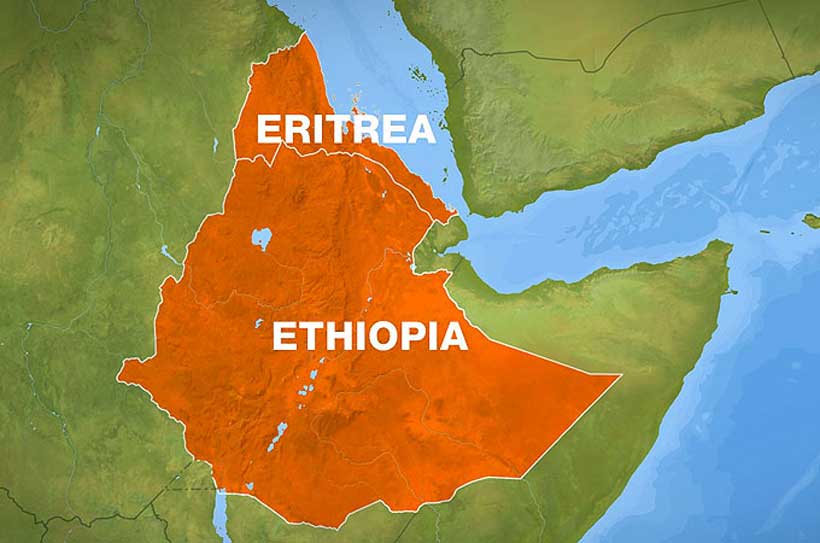While Egypt is not a direct party to the dispute between Ethiopia and Eritrea over the Red Sea port of Assab, the source of its strategic fears, especially of Ethiopian access to the sea and its implications for the balance of power in the region, may give Cairo an incentive to take advantage, or at least to subtly ratchet up tensions. Ethiopia, a landlocked country since the independence of Eritrea in 1993, has always been interested in having secure access to the seas: the port of Assab was historically the key gateway to the Red Sea. Egypt’s perception of any efforts by Ethiopia to obtain a naval or commercial presence in Assab is a possible threat to Egypt’s primacy in the security of the Red Sea and the Suez Canal-related issues.
The Assab Dispute
The port of Assab, in southern Eritrea, on the Bab el-Mandeb strait, was the primary sea outlet of Ethiopia, both before and even after Eritrean independence until the edge of the border war of 1998-2000. In the aftermath of the war, Eritrea prevented Ethiopia from accessing Assab, so Addis Ababa was forced to depend on the port of Djibouti for more than 95% of its trade, a costly and strategically vulnerable set-up .
In the past years, Ethiopia has stepped up efforts to regain access to the sea. Prime Minister Abiy Ahmed’s government has engaged in port leasing in Somaliland (2024 MoU for Berbera) and apparently engaged in sea access with different state. However, Eritrean President Isaias perception of Ethiopian intentions since a presence of any Ethiopian naval forces near Assab could be a threat to Eritrean sovereignty and power affiliation in the Red Sea.
These developments are closely monitored by Egypt. While it publically backs Eritrean sovereignty, Cairo has strategic interests in resisting Ethiopian entrenchment in the Red Sea – especially in the vicinity of Bab el-Mandeb, the Red Sea chokepoint which rivers the Suez Canal in terms of global trade significance .
In the past, during the diplomatic conflict with Ethiopia over the Renaissance Dam, Egypt made significant efforts to pressure Ethiopia, signing a memorandum of understanding with neighboring states and conducting joint military exercises. However, the successful completion of the dam would inevitably prevent a repeat of its diplomatic setbacks. Moreover, during the Ethiopian and Somaliland sea access Agreement was signed, Egypt pressured the treaty alongside with Somalia. Recent disputes between Ethiopia and Eritrea have also raised concerns about Egypt’s relations beyond the ports. It is inevitable that it will be able to carry out some of its intended actions.
- Although Egypt is unlikely to take open warfare, it could seek indirect means of increasing Ethiopia- Eritrea friction over the issue of Assab
- Intelligence and Diplomatic Leverage: Egypt may be able to ratchet up the rhetoric around Ethiopian Red Sea ambitions as destabilizing-which is already in evidence with Egypt’s opposition to the Ethiopian deal with Somaliland .
- Red Sea Alliances: The Red Sea Forum, which does not include Ethiopia, has been established in the region. The Forum, exclude Ethiopia from its historic connections to the Red Sea and neglect Ethiopia’s role as a key player in the political landscape of the Horn of Africa is expected to continue being used in a selective and potentially threatening way in the future.
Hence, Egypt’s position is based on past precedent as well as strategic doctrine:
As one of the major players in the Middle East for many years, Egypt has for centuries played an important external role in the region. Historical Role as middle east Regional Guardian Under leaders such as Gamal Abdel Nasser and more recently Abdel Fattah el-Sisi, Egypt as a regional player has positioned itself as the regional guardian of the stability of the Arab and in the Red Sea. Ethiopian maritime ambitions are a challenge to this self-appointed role.
Precedent of Nile-Red Sea Linkage: There is a precedent of linking the Egyptian water security of the Nile and the dominance of its Red Sea the thinking of the Egyptian strategists. With Ethiopia already challenging Egypt on the Nile through the GERD, Cairo is afraid of a “two-front” encirclement, that is, hydrological and maritime.
While none of these amount to legal claims over Ethio- Eritrean current case, they are the foundation of the ideology behind Egyptian opposition to Ethiopian access to the maritime. This approach has been leading Eritrean state to war, neglecting the open door for diplomatic solution.
Egypt geopolitical assessment is likely to invite Ethiopia to meticulously increase the level of mistrust with Eritrea so that it can gain the hegemony of the Red Sea. Although highly historical in its foundation of dominance, these activities have the potential of encouraging a chain of militarization, economic pressure and proxy wars in one of the most important maritime routes globally. What is needed from Egypt is a cooperative approach to the Red Sea and leave that to direct concerned states, rather than a competitive containment which will result in a new front of conflict in the Horn.


